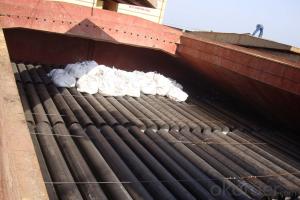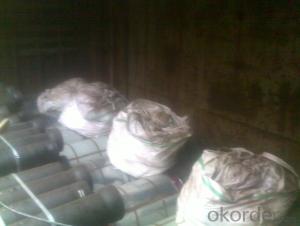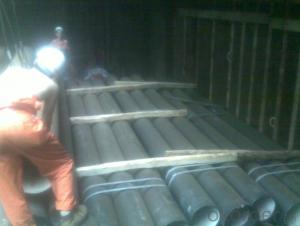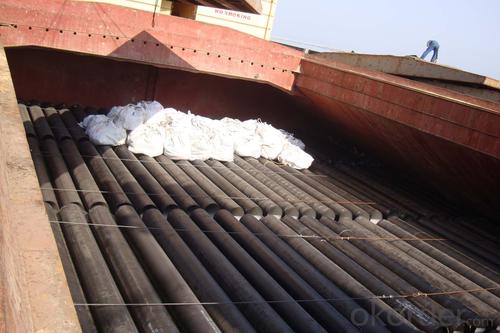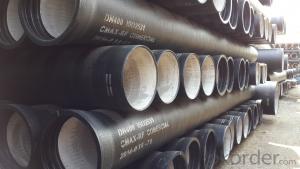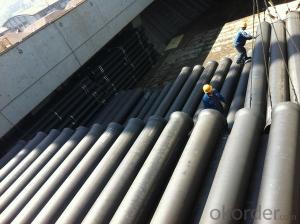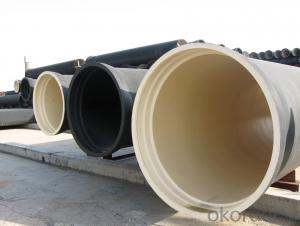K Type Ductile Iron Pipe DN200
- Loading Port:
- China Main Port
- Payment Terms:
- TT or LC
- Min Order Qty:
- 23 m.t.
- Supply Capability:
- -
OKorder Service Pledge
OKorder Financial Service
You Might Also Like
1) The standard of pipe: ISO2531:1998, EN545:2006,K9 K8
2) Effective length: 6m/5.7m
3) Inner cement line: Portland cement lineas per ISO4179
4) Zinc coating: at least 130g/m2 as per ISO8179
5) Bitumen painting: at least 70μm as per ISO8179
6)With 102% quantity of NBR, SBR, or EPDM ring asper ISO4633
7) DN80-DN1200
8) Highstrength, lighter than grey iron, good corrosion resistance, no furring, smallflow resistance, easy fixing, long life tome about 100 yeas
9)Checked by automatic inspection equipment
10) Composition:
Chemical composition | |||
Chemical composition | Ductile Cast Iron Pipe (%) | Grey iron pipe (%) | Steel pipe (%) |
C | 3.5-4.0 | 3.2-3.8 | 0.1-0.2 |
Si | 1.9-2.6 | 1.4-2.2 | 0.15-0.4 |
Mn | 0.15-0.45 | 0.4-0.6 | 0.3-0.6 |
P | ≤0.06 | ≤0.3 | 0.02-0.03 |
S | ≤0.02 | ≤0.1 | 0.02-0.03 |
Mg | 0.03-0.06 |
|
|
11) Feature:
Mechanical properties | |||
| Ductile Cast Iron Pipe | Grey Iron Pipe | Steel Pipe |
Tensile Strength(Mpa) | ≥420 | 150-260 | ≥400 |
Yield Strength(Mpa) | ≥300 | No Confirmation | No Confirmation |
Bending Strength(Mpa) | ≥590 | 200-360 | ≥400 |
Elongation (%) | ≥10 | Neglected | ≥18 |
Brinell Hardness(HBS) | ≤230 | ≤230 | About 140 |
12) T type mechanical joint
13) Packing: in bulk or container
- Q: Are ductile iron pipes suitable for power plant applications?
- Yes, ductile iron pipes are suitable for power plant applications. Ductile iron is a type of cast iron that has enhanced strength, durability, and flexibility compared to traditional cast iron pipes. These properties make ductile iron pipes ideal for power plant applications where they are exposed to high pressure, extreme temperatures, and corrosive environments. Power plants often require a reliable and robust piping system to transport various fluids such as water, steam, and chemicals. Ductile iron pipes have high tensile strength and can withstand high pressure, ensuring the safe and efficient flow of these fluids within a power plant. Their ability to handle high-pressure steam makes them particularly suitable for power generation applications. Additionally, ductile iron pipes have excellent resistance to corrosion, which is crucial in power plants where many fluids can be highly corrosive. The internal and external linings of these pipes protect them from corrosion, ensuring a longer service life and reducing maintenance costs. This corrosion resistance also makes them suitable for transporting chemicals and wastewater within a power plant. Another benefit of ductile iron pipes is their ability to withstand extreme temperatures. Power plants often operate at high temperatures, and ductile iron pipes can handle these conditions without compromising their structural integrity. They have a high melting point and can resist thermal expansion and contraction, making them suitable for applications involving hot fluids and steam. Furthermore, ductile iron pipes are cost-effective compared to other materials commonly used in power plants, such as stainless steel or carbon steel. They offer a balance between performance and cost, making them an attractive choice for power plant applications. In conclusion, ductile iron pipes are well-suited for power plant applications due to their strength, durability, flexibility, corrosion resistance, and ability to withstand high pressures and extreme temperatures. Their cost-effectiveness further adds to their suitability for power plant piping systems.
- Q: Can ductile iron pipes be repaired if they are damaged?
- Yes, ductile iron pipes can be repaired if they are damaged. The extent of the damage will determine the type of repair that is needed. In cases where the pipe is cracked or has small holes, a repair clamp or a stainless-steel sleeve can be used to seal the damaged area. These methods provide a temporary fix and allow for the flow of water to continue until a more permanent repair can be made. For more severe damage, such as large cracks or broken sections, a full replacement may be necessary. This involves cutting out the damaged section of the pipe and installing a new piece. This process requires specialized equipment and expertise, but it can effectively restore the functionality of the pipe. It is important to note that the repair of ductile iron pipes should be carried out by trained professionals who have experience in working with this type of material. This ensures that the repairs are done correctly and do not compromise the integrity and safety of the pipeline system. Regular inspection and maintenance of ductile iron pipes can help identify any potential issues early on and prevent extensive damage that may require replacement rather than repair.
- Q: Is it better to use steel tubes or ductile iron pipes for water supply?
- You need a definite environment to say which kind of pipe is good!1, ductile iron pipe is cheap, corrosion resistance, lack of toughness is poor, not easy to process;
- Q: What is the expected deflection range for ductile iron pipes?
- The expected deflection range for ductile iron pipes can vary depending on several factors such as pipe diameter, wall thickness, soil conditions, and installation methods. Generally, ductile iron pipes have a higher deflection capacity compared to other materials like PVC or concrete pipes. For smaller diameter ductile iron pipes (up to 12 inches), the expected deflection range is typically around 2-3% of the pipe diameter. This means that a 12-inch ductile iron pipe could deflect up to approximately 0.24-0.36 inches. For larger diameter ductile iron pipes (greater than 12 inches), the expected deflection range can be slightly higher, ranging from 2-5% of the pipe diameter. This means that a 24-inch ductile iron pipe could deflect up to approximately 0.48-1.2 inches. It is important to note that these values are general estimates and should be verified with the manufacturer's specifications or engineering design guidelines for a specific project. Additionally, proper installation techniques and backfilling practices should be followed to ensure the pipe's structural integrity and prevent excessive deflection.
- Q: Are ductile iron pipes suitable for use in mining tailings pipelines?
- Yes, ductile iron pipes are suitable for use in mining tailings pipelines. Ductile iron has excellent strength and durability properties, making it capable of withstanding the high pressure and abrasive nature of tailings. Furthermore, its corrosion resistance and ability to withstand harsh environmental conditions make it a reliable choice for mining applications.
- Q: How do ductile iron pipes handle soil erosion?
- Ductile iron pipes are known for their exceptional strength and durability, making them highly resistant to soil erosion. The material used in ductile iron pipes is specifically engineered to withstand the effects of soil erosion, ensuring a long-lasting and reliable infrastructure. The composition of ductile iron pipes includes a mix of iron, carbon, and other alloying elements, which provides the necessary strength and resilience to withstand the forces exerted by soil erosion. These pipes have a higher tensile strength than traditional cast iron pipes, allowing them to resist deformation and cracking under pressure. Furthermore, ductile iron pipes have a protective layer called cement mortar lining, which acts as a barrier between the pipe and the surrounding soil. This lining provides an additional layer of resistance against corrosion and erosion caused by the soil's chemical composition or abrasive particles. As a result, ductile iron pipes remain intact and continue to function effectively even in areas with high soil erosion rates. In terms of installation, ductile iron pipes are designed to be buried underground, ensuring that they are well-protected from direct contact with the soil. Additionally, their jointing systems are designed to provide a secure and watertight connection, minimizing the risk of soil infiltration and subsequent erosion. Overall, ductile iron pipes have a proven track record of effectively handling soil erosion due to their superior strength, protective linings, and appropriate installation techniques. They offer a reliable and long-lasting solution for water and wastewater infrastructure, even in areas prone to soil erosion.
- Q: Can ductile iron pipes be used for geothermal heating and cooling systems?
- Yes, ductile iron pipes can be used for geothermal heating and cooling systems. Ductile iron pipes are known for their strength and durability, making them suitable for underground applications like geothermal systems. They can withstand the high temperatures and pressure variations associated with geothermal heating and cooling, making them a reliable choice for this purpose.
- Q: Are there any special considerations for installing ductile iron pipe in rocky soils?
- Yes, there are special considerations for installing ductile iron pipe in rocky soils. The presence of rocks can pose challenges during the installation process as they can cause damage to the pipe or impede its proper alignment. Therefore, it is important to carefully assess the soil conditions and rock content at the installation site. Additional measures such as proper bedding and backfilling techniques, using protective coatings or linings, and employing specialized equipment may be necessary to ensure the durability and longevity of the ductile iron pipe in rocky soils.
- Q: How much is the manual installation fee of ductile iron pipes from 100 to 150 per metre?
- DN150 ductile iron water supply pipe installation interface is not the same way, the installation of labor costs will be somewhat different
- Q: How do ductile iron pipes compare to PVC pipes?
- Ductile iron pipes and PVC pipes are two common materials used for plumbing and water distribution systems. While both have their advantages and disadvantages, there are several factors to consider when comparing the two. Strength and Durability: Ductile iron pipes are known for their exceptional strength and durability. They have a high resistance to pressure and can withstand heavy loads, making them suitable for underground applications and areas with high traffic. On the other hand, PVC pipes are less sturdy and can be more vulnerable to cracking or breaking under extreme conditions. However, PVC pipes are resistant to corrosion and do not rust, which can be a significant advantage in certain environments. Installation and Maintenance: Ductile iron pipes are heavier than PVC pipes, making them more challenging to handle and install. They require specialized equipment and skilled labor to be properly installed. In contrast, PVC pipes are lightweight and easy to handle, making them simpler and quicker to install. Additionally, PVC pipes require less maintenance as they do not corrode or develop mineral deposits over time, unlike ductile iron pipes which may require regular cleaning and maintenance to prevent rust and sediment buildup. Cost: PVC pipes are generally more affordable than ductile iron pipes. The lower material and installation costs associated with PVC pipes make them a popular choice for residential and commercial plumbing projects on a budget. Ductile iron pipes, while offering superior strength and durability, tend to be more expensive due to the higher cost of materials, specialized installation requirements, and additional maintenance expenses. Environmental Impact: PVC pipes are made from plastic materials, which are derived from non-renewable resources and can have a negative impact on the environment during production and disposal. Ductile iron pipes, on the other hand, are made from recycled iron and have a longer lifespan, reducing the need for replacement and minimizing waste. However, it is worth noting that PVC pipes can be recycled, and many manufacturers have implemented sustainable practices to minimize their environmental footprint. In summary, ductile iron pipes and PVC pipes have distinct characteristics that make them suitable for different applications. Ductile iron pipes excel in strength and durability, making them ideal for heavy-duty applications, while PVC pipes offer cost-effectiveness, easy installation, and resistance to corrosion. Ultimately, the choice between the two materials depends on the specific requirements, budget, and environmental considerations of the project.
Send your message to us
K Type Ductile Iron Pipe DN200
- Loading Port:
- China Main Port
- Payment Terms:
- TT or LC
- Min Order Qty:
- 23 m.t.
- Supply Capability:
- -
OKorder Service Pledge
OKorder Financial Service
Similar products
Hot products
Hot Searches
Related keywords
